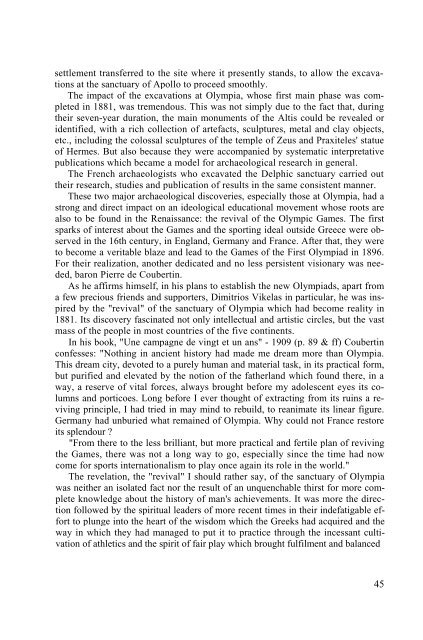You also want an ePaper? Increase the reach of your titles
YUMPU automatically turns print PDFs into web optimized ePapers that Google loves.
settlement transferred to the site where it presently stands, to allow the excavations<br />
at the sanctuary of Apollo to proceed smoothly.<br />
The impact of the excavations at Olympia, whose first main phase was completed<br />
in 1881, was tremendous. This was not simply due to the fact that, during<br />
their seven-year duration, the main monuments of the Altis could be revealed or<br />
identified, with a rich collection of artefacts, sculptures, metal and clay objects,<br />
etc., including the colossal sculptures of the temple of Zeus and Praxiteles' statue<br />
of Hermes. But also because they were accompanied by systematic interpretative<br />
publications which became a model for archaeological research in general.<br />
The French archaeologists who excavated the Delphic sanctuary carried out<br />
their research, studies and publication of results in the same consistent manner.<br />
These two major archaeological discoveries, especially those at Olympia, had a<br />
strong and direct impact on an ideological educational movement whose roots are<br />
also to be found in the Renaissance: the revival of the Olympic Games. The first<br />
sparks of interest about the Games and the sporting ideal outside Greece were observed<br />
in the 16th century, in England, Germany and France. After that, they were<br />
to become a veritable blaze and lead to the Games of the First Olympiad in 1896.<br />
For their realization, another dedicated and no less persistent visionary was needed,<br />
baron Pierre de Coubertin.<br />
As he affirms himself, in his plans to establish the new Olympiads, apart from<br />
a few precious friends and supporters, Dimitrios Vikelas in particular, he was inspired<br />
by the "revival" of the sanctuary of Olympia which had become reality in<br />
1881. Its discovery fascinated not only intellectual and artistic circles, but the vast<br />
mass of the people in most countries of the five continents.<br />
In his book, "Une campagne de vingt et un ans" - 1909 (p. 89 & ff) Coubertin<br />
confesses: "Nothing in ancient history had made me dream more than Olympia.<br />
This dream city, devoted to a purely human and material task, in its practical form,<br />
but purified and elevated by the notion of the fatherland which found there, in a<br />
way, a reserve of vital forces, always brought before my adolescent eyes its columns<br />
and porticoes. Long before I ever thought of extracting from its ruins a reviving<br />
principle, I had tried in may mind to rebuild, to reanimate its linear figure.<br />
Germany had unburied what remained of Olympia. Why could not France restore<br />
its splendour ?<br />
"From there to the less brilliant, but more practical and fertile plan of reviving<br />
the Games, there was not a long way to go, especially since the time had now<br />
come for sports internationalism to play once again its role in the world."<br />
The revelation, the "revival" I should rather say, of the sanctuary of Olympia<br />
was neither an isolated fact nor the result of an unquenchable thirst for more complete<br />
knowledge about the history of man's achievements. It was more the direction<br />
followed by the spiritual leaders of more recent times in their indefatigable effort<br />
to plunge into the heart of the wisdom which the Greeks had acquired and the<br />
way in which they had managed to put it to practice through the incessant cultivation<br />
of athletics and the spirit of fair play which brought fulfilment and balanced<br />
45

















